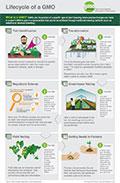Question
On different websites I see people saying that GMOs are good and their bad, but my question is. What is the Transformation of GMOs?
Submitted by: Stepheny Pryce
Answer
Expert response from Community Manager
Moderator for GMOAnswers.com
Thursday, 28/06/2018 17:47
We have answered similar questions about GMOs being “good” or “bad.”
This response addresses the positives and benefits that GMOs offer. A snippet is included below:
“GMOs are considered an important tool in addressing complex issues around the globe. From environmental sustainability to nutritional benefits, we’ve outlined many of the important ways GMOs can provided benefits to farmers, consumers and the environment in this response.
Additionally, this response further discusses the positive ways that GM crops contribute to food security, sustainability, the environment and climate change. “
This response addresses the question of GMOs being “bad” for you. A snippet is included below:
“No [GMOs are not bad for you], in fact, as explained in this response, “the overwhelming consensus of scientific experts and major scientific authorities around the world, including the World Health Organization, United Nations Food and Agriculture Organization and the American Medical Association have ruled that GMOs are safe.”
When people refer to Genetically Modified Organisms (GMOs), they are referring to precision plant breeding using genetic engineering. It allows plant breeders to take a desirable trait (like resistance to drought, insects, weeds, and disease) from one plant or organism and transfer it to the plant they want to improve, as well as make a change to an existing trait in a plant they are developing. You may have also heard of agricultural biotechnology or biotech seeds. These are terms that may be used to refer to the same thing – a genetically modified organism (GMO).
GMOs are created to achieve a desired trait, such as resistance to an insect or improvement to the ripening process, in order to better meet a customer’s needs.
Posted below is a five minute video that offers a great visual illustration on how GMOs are made:
Similarly, this response discusses the different breeding techniques or “transformations” that plants and GMOs undergo.
We hope this answers your question, if you have any other questions about GMOs or biotechnology, please ask!
